-
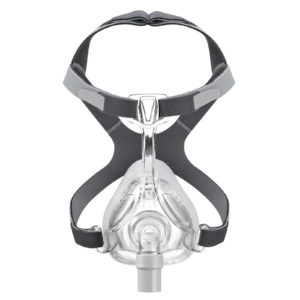
Risk-Free Masks
Shop NowShop -
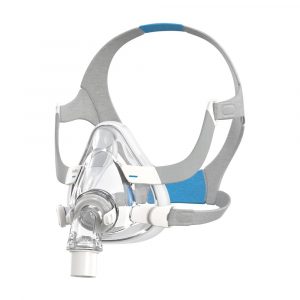
Full Face CPAP Masks
Shop NowShop -
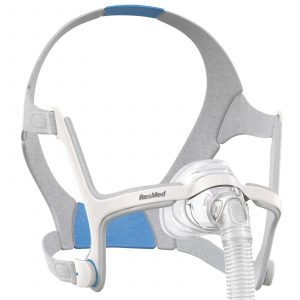
Nasal Cushion CPAP Masks
Shop NowShop -
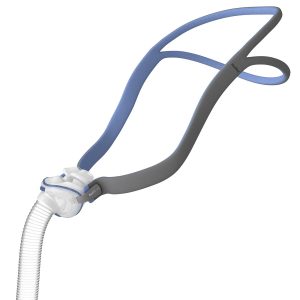
CPAP Nasal Pillows Masks
Shop NowShop -
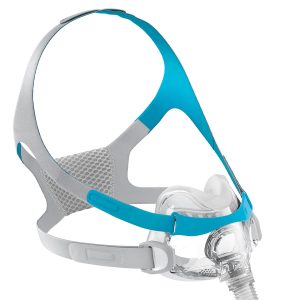
Hybrid CPAP Masks
Shop NowShop -
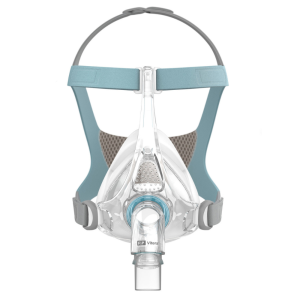
Magnet-Free CPAP Masks
Shop NowShop -
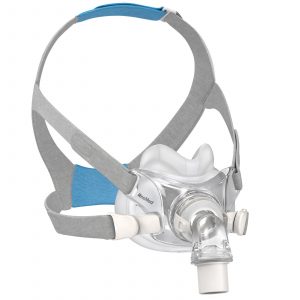
ResMed CPAP Masks
Shop NowShop -
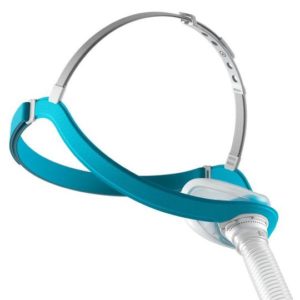
Fisher & Paykel CPAP Masks
Shop NowShop -

Air Liquide CPAP Masks
Shop NowShop -
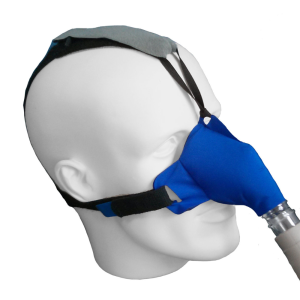
SleepWeaver Skin-Friendly CPAP Masks
Shop NowShop -
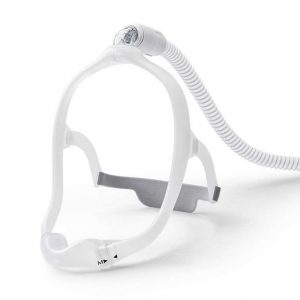
Philips CPAP Masks
Shop NowShop
CPAP Masks: All you need to know
CPAP masks are an essential item of Continuous Positive Airway Pressure (CPAP) therapy to treat Obstructive Sleep Apnoea.
You wear the mask over your nose, mouth, or both and connect it to the CPAP machine using a tube. They come in different styles and sizes to fit various face shapes and personal preferences.
The Sleep Apnoea mask creates a seal to deliver pressurised air from the machine to your airway. The air keeps your airway open during sleep, preventing apnoeas and improving the quality of your sleep.
What are the different types of masks for Sleep Apnoea?
The type of CPAP mask you’ll need is dependant upon how you breathe at night. If you only breathe through your nose, then you would require a nasal mask. If you breathe through your nose and mouth (i.e. if you snore), then you would need a full face mask.
Nasal pillow masks: These masks feature small pillows that fit into the nostrils. This delivers air directly into the nasal passages. These are minimal contact masks as they have the least amount of contact on your face, making them ideal for those with facial hair.
Nasal cushion masks: These masks go over the nose. They are popular for their lightweight and minimal design, offering a good balance between comfort and effectiveness.
Full-face masks: Full-face masks go over the nose and mouth like an oxygen mask. These are good secondary masks for nasal breathers when they have congestion or a cold. They are also recommended for those with a deviated septum.
Hybrid masks: These are full-face masks that sit under your nose and over your mouth. They feature two holes on top of the cushion that align with your nostrils to provide air pressure to your nose as well as your mouth.
Everyone’s facial features are different. If you need any help finding a mask or are having trouble with a mask you own, please do not hesitate to contact us. We can make suggestions to improve your comfort.
Choosing a CPAP mask style that’s right for you
Now that we have explored the different types of masks, you might already know which one sounds right for you. If you still have questions, we have provided this information video with further tips to help you choose the right mask. Our customer service team are here to help if you need assistance.
Sizing for a mask
All types of CPAP masks have different measurements, so although you might be a size medium in one mask, you won’t be a size medium in all other masks. If you choose a single-size mask, we strongly advise you to use the sizing guide. You can find the sizing guide on the ‘downloads‘ tab on the product page. Simply print this out to scale to find your size. Alternatively, some of our masks are FitPacks, including multiple mask cushion sizes, so you can try each size at home.
Mask Fit Insurance
Mask Fit Insurance is a service unique to Intus Healthcare. Adding mask-fit insurance allows you to try it for 28 days, and if you find it unsuitable, you can return it for a refund.
Please note that you must notify us before the 28 days are up that you wish to return your mask.
Getting used to your CPAP mask
Like anything you try for the first time, wearing a CPAP mask can feel strange. But if you don’t get used to wearing it, you’ll have trouble sleeping with your mask.
The adjustment period for wearing a mask varies for everyone. Some feel comfortable immediately. Others may need a few nights or weeks to get used to it. Patience is key.
Gradually increasing the amount of time you wear your mask during the evening will also help you adjust to the feeling of the mask on your face. Try wearing your mask whilst reading or watching TV before getting settled to sleep. This will help you get used to wearing the mask before wearing it all night.
It’s important to fine-tune the fit of your mask regularly. If you notice red marks on your face after waking up, it’s a sign to loosen the mask slightly. On the other hand, if the mask slips off during the night, it needs to be tightened. Remember, even though a healthcare professional or equipment supplier might have initially adjusted your mask, you still have the flexibility to adjust it further for enhanced comfort
Watching an online fitting video when you first get your mask can also help make sure you have your mask fitted correctly and comfortably. You can find these videos on our mask product pages.
Some CPAP users also like to use mask liners; these can help with comfort and create a hygienic barrier between the mask and your skin.
If you need any help, you can always contact our customer service team, who will be happy to advise you.
UNIVERSAL CPAP COMPATIBILITY
All masks are compatible with all CPAP devices. If you are fitting a new mask to your existing CPAP set-up and find your CPAP tubing does not connect to the mask, do not worry. It is likely that part of the old mask is still connected to your tubing. If you compare the two ends of the CPAP tubing, both ends should look the same (unless you are using a heated hose). If they are not, identify the rogue part and remove it (this may take some effort, but it will come out). Once removed, the tube should then connect to your new mask without a problem.
CPAP Masks FAQs
CPAP masks work with various sleeping positions, but certain masks are better for specific positions. For instance, if you like sleeping on your side or stomach, nasal cushion masks and nasal pillow masks are usually a good fit. On the other hand, full-face masks offer stability for people who tend to change positions often during sleep.
You can enhance your comfort with items like CPAP pillows, which have special cut-outs on the side. The cut-outs prevent the mask from being dislodged when sleeping on your side.
Masks are medical equipment and cannot be returned once opened or used. However, if you purchase mask fit insurance or choose one of the risk-free CPAP masks you can return the mask for a refund.
Mask-Fit Insurance
If you are considering trying a mask for the first time, you can confidently order using Mask Fit Insurance. Mask Fit Insurance costs £14.99 for nasal masks and £19.99 for full-face masks. Mask-fit insurance allows you to return a mask for a refund if it is unsuitable.
Make sure to clean your masks and CPAP equipment regularly. You are advised to wash the mask, tubing and CPAP water chamber at least once weekly.
Clean your mask in the morning after each night’s use with some Sleep Apnoea mask wipes or warm, soapy water. Please be aware that non-specific CPAP mask wipes may contain alcohol, which can damage your mask.
It only takes a few minutes:-
- Unplug your device and disconnect the mask.
- Disassemble the mask and wash the parts thoroughly with warm, soapy water. Avoid strong detergents, which can damage the mask and leave harmful residues behind.
- Rinse the parts thoroughly in warm, drinking-quality water.
- Place the parts on a flat surface on a towel to dry naturally. Avoid placing them in direct sunlight or on a radiator
For a comprehensive guide, see our article: How to effectively clean your CPAP equipment.
If your mask used to seal well but is now leaking, it might mean the cushion is wearing out. The silicone used on most mask cushions weakens over time, making it less effective. While tightening the headgear can help for a while, it won’t be a long-term solution.
To fix the issue, replacing the cushion should work. You should purchase a new mask if the cushion cannot be replaced.
For more information on solving mask leaks – check out our comprehensive guide.
The lifespan of a CPAP mask can vary, but, in general, you might need to replace certain parts every few months. The cushions may need replacing every 3 months. The headgear and straps might last a bit longer, usually up to 6 months to a year. Full-face masks could require replacement every 3-6 months.
Look for any signs of wear, like leaks or cracks. Regularly clean and maintain your mask to make it last longer. If you notice issues, it’s a good idea to replace the necessary parts or the whole mask. Check the user manual for cleaning and replacement guidelines.


